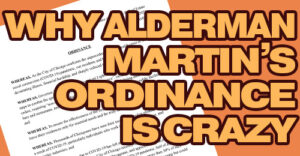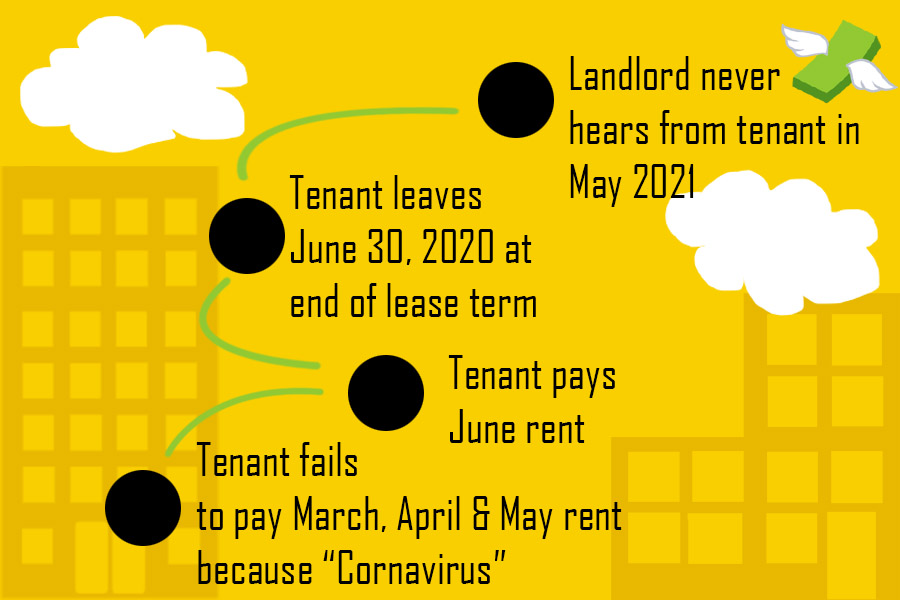 Ordinance Fails to Account for Reality
Ordinance Fails to Account for Reality
As promised, here’s a deeper dive into 47th Ward Alderman Matt Martin’s Rent Deferment Ordinance. I have always believed that you learn a great deal about someone’s character by observing how they act when under duress. It’s easy to “do the right thing” when things are good. But what do you do when things get tough? As a practicing attorney, I’ve been heartened to see landlords who have been overly generous with their tenants during this crisis. For some, it is about money and doing what is best in the long term. For many, it is about doing what is right and helping your fellow man. I’ve seen Illinois landlords provide rent abatement, rent deferral, and lease releases to distressed tenants as a result of this pandemic. By and large, they are making rational, smart choices and are working with their tenants.
But, when the “system” gets involved and makes blanket rules, we often see systemic solutions result in unintended consequences. The recently proposed Rent Deferment Ordinance is a piece of legislation that surely comes from a good place and is so wildly unrealistic that it is doomed to failure and certain to do major harm to Chicago’s landlords who have taxes and mortgages to pay.
The Deferred Rent Provision
Let’s examine the main section of the ordinance, the rent deferral portion contained in Section 2:
SECTION 2. In the event of non-payment of rent during the stay at home order, tenants shall have up to twelve (12) months following the date on which the stay at home order is rescinded to repay any past due rent if the tenant is unable to pay rent during the stay at home order due to circumstances related to the novel coronavirus (COVID-19) pandemic, including loss of income due to a COVID-19-related workplace closure, increased or additional child care expenditures due to school closures or changed work schedules, healthcare and other expenses related to being ill with COVID-19 or caring for a member of the tenant’s household or family who is ill with COVID-19, or reasonable expenditures that stem from government-ordered emergency measures. Tenants may use the protections afforded in this Section as an affirmative defense to any action brought pursuant to Section 2-14-200 or Section 5-12-130(a) of the Code.
However, the tenant and landlord may, prior to the rescission of the stay at home order or within 90 days of the first missed rent payment, whichever comes first, mutually agree to a plan for repayment of unpaid rent selected from options promulgated by the Commissioner of the Department of Housing. The Commissioner of the Department of Housing shall promulgate a series of options for repayment agreements under this Section within 30 days after the effective date of this Ordinance. In promulgating such options, the Commissioner shall take into account the interests of both tenants and landlords.
Practical Problems
There are a few practical problems in this section. First, the ordinance suggests that the deferred rent shall be available to any tenant who is “unable to pay rent during the stay at home order due to circumstances related to the novel coronavirus (COVID-19) pandemic”. Does this mean that tenants who are able to pay the rent must continue to do so? Does this mean that tenants must actually prove their coronavirus-related need? How strict will that requirement be? There is a mention of the Housing Commissioner’s involvement, but I’m doubtful that the City will be making case-by-case decisions. Even if a tenant has been impacted by the coronavirus, they might actually be in a position to pay rent. Shouldn’t they? Reportedly, as a result of enhanced unemployment insurance and government stimulus payments, some workers have been making more money being unemployed than when they had a job! Will that be taken into account?
Second, if there is a low bar for proving need, we can expect that tenants who COULD pay rent will DECIDE not to pay. They will make a choice. The City of Chicago learned about this problem in the wake of Mayor Lori Lightfoot’s decision to stop water shutoffs for nonpayment. What happens when there is no threat of a water shut off? People stop paying. Once the threat of eviction is gone, tenants will stop paying. Again, the market has been handling this. Landlords and tenants need to communicate. They need to collaborate. Some tenants are taking advantage. Some tenants really need help. Landlords should get a chance to decide which is which. This law takes the power from the landlord and does little to nothing to discourage tenants from taking advantage of the system.
Logistical problems
Way more important is the real life application of this proposed law. The logistical realities of the deferment timing create a very real and unsolvable problem for landlords. Simply put, when tenants have the option to avoid paying months-worth of rent, not only will they likely not be able to “catch up” and pay the deferred rent, but they just plain will not pay it, even if they could. Giving a tenant twelve months to pay is way too long. Not only does it ignore the fact that landlords have mortgages and taxes to pay during the stay at home order, but it ignores the reality that over time, tenants will care little about the plight of their former landlord. Let’s concoct a scenario:
A tenant has a lease that runs from July 1, 2019 to June 30, 2020. The Coronavirus hits. Being concerned about his future, like one third of American renters, tenant John Doe decides not to pay his rent for April, 2020. In fact, John then hears about Alderman Martin’s plan and decides he doesn’t like paying rent very much (and really likes having extra money in his pocket, especially at a time of possible need), so John Doe again elects to withhold his rent. Then, we get to March 26, 2020 (the day that Wisconsin has currently chosen to lift their restriction) and the stay at home order is lifted. John Doe knows his protection is gone and now he better pay his rent on June 1, so he does. John Doe now has until March 26, 2021 to pay his rent. He decides to non-renew his lease and leaves the apartment on June 30, 2020. Because of the massive municipal and state debts that have soared during the pandemic, John assumes that taxes in Illinois are going to go up. He decides to move to South Dakota, where income taxes are low. In March, 2021, John sits looking at Mt. Rushmore and remembers his old landlord in Chicago and his debt that is due in twenty six days. John laughs to himself and muses “I wonder what my old landlord will do when he tries to find me.”
 Since landlords governed by the Chicago Residential Landlord and Tenant Ordinance are not allowed to get attorneys fees added to a judgment, John Doe’s landlord is disappointed to learn that even if he can find John Doe, the lawsuit to get a judgment for back rent and the lawsuit to collect upon that judgment (and the costs associated with pursuing a judgment against an out-of-state resident) will cost many thousands of dollars more than the amount of rent the landlord will sue for. I guess the landlord can just chalk that loss up to force majeure. Like Seinfeld’s Kramer said to Jerry, “Just write it off!”
Since landlords governed by the Chicago Residential Landlord and Tenant Ordinance are not allowed to get attorneys fees added to a judgment, John Doe’s landlord is disappointed to learn that even if he can find John Doe, the lawsuit to get a judgment for back rent and the lawsuit to collect upon that judgment (and the costs associated with pursuing a judgment against an out-of-state resident) will cost many thousands of dollars more than the amount of rent the landlord will sue for. I guess the landlord can just chalk that loss up to force majeure. Like Seinfeld’s Kramer said to Jerry, “Just write it off!”
The only conclusion
Alderman Martin has his heart in the right place. Maybe this is a starting point, but it cannot be a finishing point. If passed, this plan is, unfortunately, unworkable and amounts to a license to steal rent from landlords. Let’s hope landlord and tenant advocates work together on this to come up with a solution workable for both sides. As it stands, without major revision, landlords should vehemently oppose this legislation.
